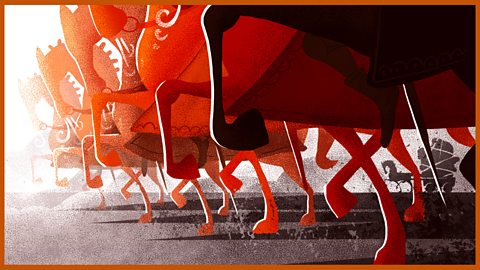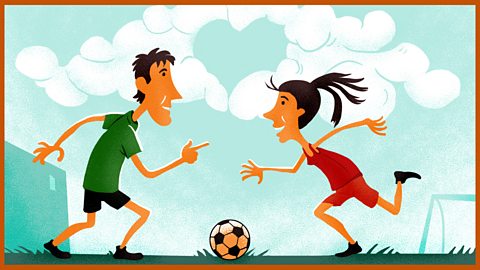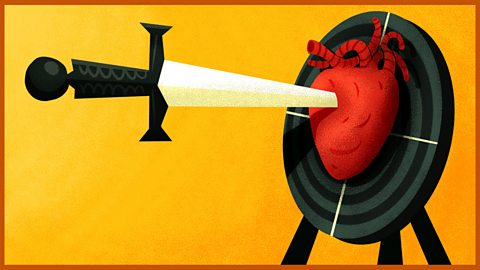All for a pound of flesh
Synopsis
This story is based on The Merchant of Venice, which is considered to be one of Shakespeare‚Äôs ‚Äėproblem plays‚Äô, containing elements of tragidrama and comedy which are difficult to reconcile. In this adaptation, the story is told through the eyes of a young slave boy who realises that, to most, he is as invisible as ‚Äėa dog or a goat‚Äô. It is a faithful and detailed re-telling which raises some very interesting questions about freedom, slavery and humanity. Is Portia any freer than a slave if her father has decreed that she must marry anyone who solves a riddle? Aren‚Äôt we all human, whether we are Jewish, Christian, slave or master?

Interview with writer Jamila Gavin
Őż
Ideas for use in the classroom
PSHE/RE
Modern productions of The Merchant of Venice shy away from making Shylock a ‚Äėvillain‚Äô. He is horribly treated by the Christians in the play, who relentlessly mock him for his beliefs and who are overjoyed when his daughter runs off with a Christian. He is not a good man, but as the re-telling says he ‚Äėwas bitter about the way he was treated just for being Jewish; often pushed around and insulted. This had made him mean and hard, and turned him into a bully‚Ķ‚Äô
Questions to think about:
- Many religions (including Christianity and Judaism) have explicit rules that state we should treat others as we expect to be treated. Does this happen in the play? How is Shylock treated? How does Shylock treat others?
- What happens when somebody is treated badly by others? What effect might it have on the way they behave in the future? Why do bullies act the way they do?
- Why is it important that we respect the beliefs of others, even if they are different from our own?
Ask children to listen carefully to what Tomas says at the very start of the programme. (‚ÄėI‚Äôm human: I see, hear, speak, touch,smell.‚Äô) Now read out Shylock‚Äôs famous speech (and if possible give out a hard copy for children to read),
I am a Jew. Hath not a Jew eyes? Hath not a Jew hands, organs, dimensions, senses, affections, passions? Fed with the same food, hurt with the same weapons, subject to the same diseases, healed by the same means, warmed and cooled by the same winter and summer, as a Christian is? If you prick us, do we not bleed? If you tickle us, do we not laugh? If you poison us, do we not die?
Can the children see similarities between the two speeches? This could be followed up with questions for debate such as:
What makes us human?
What would it be like if we were all exactly the same?
Is it difficult for people of different religions or social backgrounds to be friends?
Is it better to be rich or poor?
Is it better to be rich and miserable or poor and thankful for what you have?
Is there a difference between being ‚Äėrich‚Äô and being ‚Äėwealthy‚Äô?
Other than money, what else might constitute ‚Äėwealth‚Äô?
What does it mean to have ‚Äėfreedom‚Äô?
What freedoms do we take for granted that others do not have?
Discussions about freedom and slavery based on Tomas’s story might develop into discussions about rights, responsibilities, Classroom Charters and subsequent lessons on UNICEF’s Conventions on the Rights of the Child, for which resources and lesson plans are widely available.
English
In the re-telling, when Portia (disguised as Balthazar) tries to persuade Shylock to show mercy, she speaks the following words:
‚ÄúShylock! You can‚Äôt put a value on mercy. It is good, gentle, like soft rain, blessing the person who gives mercy as well as theperson who receives it.‚ÄĚ
Shylock however, maintains that he will have what he is entitled to. Kindness is not an option.
Questions and Activities:
Look up the word ‚Äėmercy‚Äô in the dictionary. What does it mean? Why does mercy bless the person who show mercy and theperson who receives it? (Or why is it good to forgive someone as well as to be forgiven?). Children could hold a debate or write a persuasive argument either FOR or AGAINST Portia‚Äôs position (for Shylock to show mercy to Antonio) using evidence from the re-telling to support their views and including evidence of their own they have collected or collated during whole class mind mapping (eg based on personal experiences or by making links to national news stories, TV and films, books they have read, etc.)
Drama and performance
- Generate questions to Hot Seat Shylock, Antonio and the slave boy Tomas based on the re-telling of the story.
- Create a role on the wall for Shylock, Antonio and Tomas based on what we learn about them in the re-telling.
- As we have seen, status is very important in this story and in its retelling. In small groups, children could devise short dramas thatdeal with status and show them back to the rest of the class for discussion. Examples may include; a child being bullied/ someonestanding up to a bully/ a teacher or parent punishing a child unfairly/ a customer complaining in a shop or restaurant.
See Teachers' notes below for more ideas

Őż
Őż
More from this series
Henry V - A Soldier’s Tale. audio
A short story inspired by Henry V written by Geraldine McCaughrean. Read by David Gyasi.

Romeo v Juliet. audio
A Chris Priestley story inspired by Romeo and Juliet. Read by Sarah Macdonald Hughes.

Ol'Fella. audio
A Paul Stewart story inspired by Othello. Read by David Gyasi.
